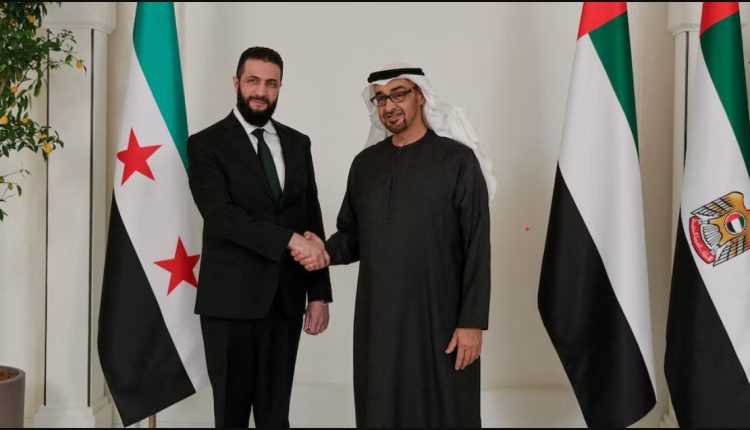UAE Hosts Secret Talks Between Israel and Syria Amid Border Tensions
By Kardo Roj
ABU DHABI, UAE (North Press) – The United Arab Emirates has initiated a discreet diplomatic channel between Syria and Israel aimed at reducing tensions along the volatile southern Syrian frontier, sources familiar with the matter told Reuters. The indirect talks, which have yet to produce formal agreements, reportedly focus on security cooperation and intelligence-sharing amid mounting concerns over regional instability.
According to three sources—including a Syrian security official and a regional intelligence operative—the backchannel began shortly after Syrian President Ahmed al-Sharaa met with UAE President Sheikh Mohamed bin Zayed Al Nahyan in Abu Dhabi on April 13. The discussions are currently limited to “technical and security-related” issues, with broader political dialogue not yet on the table.
Focus on Security Amid Regional Shifts
The confidential talks come at a time of significant transition for Syria. Since the December 2024 ousting of former President Bashar al-Assad, Syria’s new leadership has sought to reposition itself in the region by asserting its commitment to territorial integrity and counterterrorism. President Sharaa, once affiliated with extremist groups, has since sought to present a moderated stance, aiming to ease the fears of neighboring states and Syria’s diverse internal factions.
One Syrian security source noted that the backchannel, facilitated by UAE officials, excludes direct military matters, particularly those concerning Israeli strikes inside Syria. Instead, the current focus appears to be counterterrorism coordination—an area where Syria’s new rulers seek to build credibility.
UAE officials have not commented publicly, nor has the Israeli Prime Minister’s office, reflecting the high sensitivity surrounding these contacts.
Israeli Concerns and Military Escalation
The existence of the backchannel comes to light in the aftermath of a series of Israeli airstrikes in Syria, including one that hit within 500 meters of the presidential palace in Damascus. Israel justifies its ongoing military campaign in Syria as a necessary measure to counter Iranian influence and prevent an Islamist militant presence near its northern borders.
According to Reuters, Israeli officials have grown increasingly alarmed by the composition of Syria’s new government, particularly its Islamist elements. Israel has reportedly increased its lobbying efforts in Washington to prevent international normalization with the new Syrian leadership, instead urging continued isolation and decentralization.
Israeli military actions have also intensified following recent clashes in southern Syria between Sunni and Druze communities. These tensions escalated after the release of an inflammatory audio recording and resulted in over two dozen deaths. Israel frames its actions as protecting the Druze minority, which has a notable presence in Syria, Lebanon, and Israel.
Sectarian Challenges and Security Balancing
In a bid to stabilize the sensitive Druze-majority region of Suweida, the Syrian government has recently reached an agreement with local leaders to integrate community members into state-run security forces. This pragmatic step has so far succeeded in reducing friction and is part of a broader initiative by President Sharaa to unify Syria’s fragmented armed landscape under a single national command.
Nevertheless, deep-seated sectarian divisions remain a central challenge. The massacre of hundreds of Alawites in March 2025—widely attributed to hardline Islamist factions—has intensified fears among minority groups and drawn international condemnation. Such incidents highlight the fragility of Syria’s internal security situation and the necessity of inclusive governance mechanisms.
Strategic Implications for the Region
The UAE’s mediation role underscores Abu Dhabi’s growing diplomatic clout in the region and its unique position as one of the few Arab states maintaining normalized relations with both Israel and segments of Syria’s new government. Analysts view this effort as part of a broader Emirati initiative to contain regional instability while projecting itself as a broker of dialogue.
While the success of the current talks remains uncertain, they signal a shift in how regional powers engage with Syria’s evolving political landscape. For Syria’s Autonomous Administration in the northeast, the developments serve as a reminder of the broader geopolitical currents shaping the country’s future.
As the Syrian Democratic Forces (SDF) continue to manage security in vast swathes of the northeast and lead counterterrorism operations against Islamic State remnants, any progress in regional diplomacy could open new avenues for political dialogue that recognize the role of local governance models. Observers caution, however, that true stability will remain elusive without inclusive, representative solutions that address Syria’s diverse demographics and lingering security threats.

